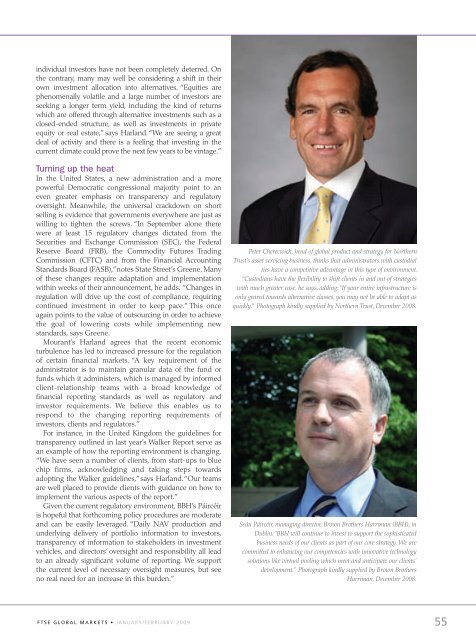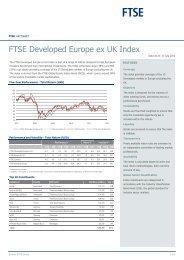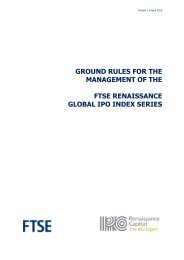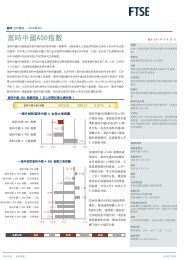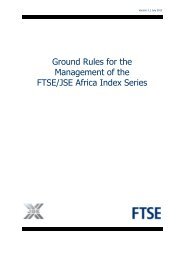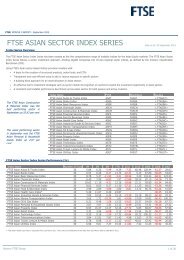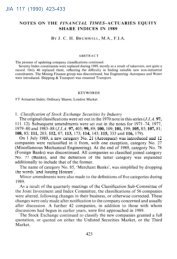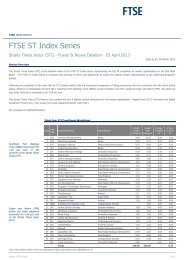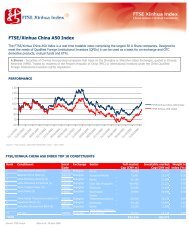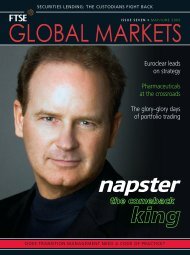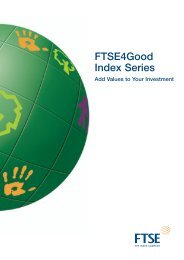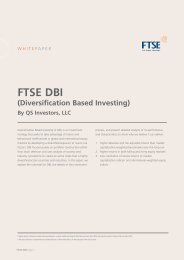You also want an ePaper? Increase the reach of your titles
YUMPU automatically turns print PDFs into web optimized ePapers that Google loves.
individual investors have not been completely deterred. On<br />
the contrary, many may well be considering a shift in their<br />
own investment allocation into alternatives. “Equities are<br />
phenomenally volatile and a large number of investors are<br />
seeking a longer term yield, including the kind of returns<br />
which are offered through alternative investments such as a<br />
closed-ended structure, as well as investments in private<br />
equity or real estate,” says Harland. “We are seeing a great<br />
deal of activity and there is a feeling that investing in the<br />
current climate could prove the next few years to be vintage.”<br />
Turning up the heat<br />
In the United States, a new administration and a more<br />
powerful Democratic congressional majority point to an<br />
even greater emphasis on transparency and regulatory<br />
oversight. Meanwhile, the universal crackdown on short<br />
selling is evidence that governments everywhere are just as<br />
willing to tighten the screws. “In September alone there<br />
were at least 15 regulatory changes dictated from the<br />
Securities and Exchange Commission (SEC), the Federal<br />
Reserve Board (FRB), the Commodity Futures Trading<br />
Commission (CFTC) and from the Financial Accounting<br />
Standards Board (FASB),”notes State Street’s Greene. Many<br />
of these changes require adaptation and implementation<br />
within weeks of their announcement, he adds. “Changes in<br />
regulation will drive up the cost of compliance, requiring<br />
continued investment in order to keep pace.” This once<br />
again points to the value of outsourcing in order to achieve<br />
the goal of lowering costs while implementing new<br />
standards, says Greene.<br />
Mourant’s Harland agrees that the recent economic<br />
turbulence has led to increased pressure for the regulation<br />
of certain financial markets. “A key requirement of the<br />
administrator is to maintain granular data of the fund or<br />
funds which it administers, which is managed by informed<br />
client-relationship teams with a broad knowledge of<br />
financial reporting standards as well as regulatory and<br />
investor requirements. We believe this enables us to<br />
respond to the changing reporting requirements of<br />
investors, clients and regulators.”<br />
For instance, in the United Kingdom the guidelines for<br />
transparency outlined in last year’s Walker Report serve as<br />
an example of how the reporting environment is changing.<br />
“We have seen a number of clients, from start-ups to blue<br />
chip firms, acknowledging and taking steps towards<br />
adopting the Walker guidelines,”says Harland.“Our teams<br />
are well placed to provide clients with guidance on how to<br />
implement the various aspects of the report.”<br />
Given the current regulatory environment, BBH’s Páircéir<br />
is hopeful that forthcoming policy procedures are moderate<br />
and can be easily leveraged. “Daily NAV production and<br />
underlying delivery of portfolio information to investors,<br />
transparency of information to stakeholders in investment<br />
vehicles, and directors’ oversight and responsibility all lead<br />
to an already significant volume of reporting. We support<br />
the current level of necessary oversight measures, but see<br />
no real need for an increase in this burden.”<br />
F T S E G L O B A L M A R K E T S • J A N U A R Y / F E B R U A R Y 2 0 0 9<br />
Peter Cherecwich, head of global product and strategy for Northern<br />
Trust’s asset servicing business, thinks that administrators with custodial<br />
ties have a competitive advantage in this type of environment.<br />
“Custodians have the flexibility to shift clients in and out of strategies<br />
with much greater ease, he says, adding:“If your entire infrastructure is<br />
only geared towards alternative classes, you may not be able to adapt as<br />
quickly.” Photograph kindly supplied by Northern Trust, December 2008.<br />
Seán Páircéir, managing director, Brown Brothers Harriman (BBH), in<br />
Dublin.“BBH will continue to invest to support the sophisticated<br />
business needs of our clients as part of our core strategy. We are<br />
committed to enhancing our competencies with innovative technology<br />
solutions like virtual pooling which meet and anticipate our clients’<br />
development.” Photograph kindly supplied by Brown Brothers<br />
Harriman, December 2008.<br />
55


